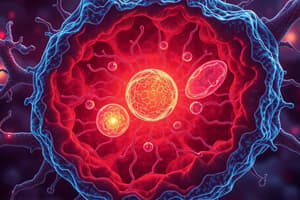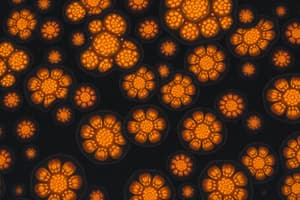Podcast
Questions and Answers
Which type of cells lacks a true nucleus?
Which type of cells lacks a true nucleus?
- Cytoplasmic cells
- Prokaryotic cells (correct)
- Eukaryotic cells
- Nuclear cells
What is the function of the nucleus in a cell?
What is the function of the nucleus in a cell?
- Control center of the cell (correct)
- Responsible for movement of substances within the cell
- Contains various cell organelles
- Site of various biochemical reactions
What is the main function of the cytoplasm in a cell?
What is the main function of the cytoplasm in a cell?
- Contains the genetic material of the cell
- Responsible for movement of substances within the cell (correct)
- Responsible for carrying out various functions in the organism
- Site of various biochemical reactions
Which part of a eukaryotic cell contains the genetic material?
Which part of a eukaryotic cell contains the genetic material?
What are specialized structures within the cell that perform specific functions called?
What are specialized structures within the cell that perform specific functions called?
Which organelle is responsible for generating ATP, the primary source of energy for the cell?
Which organelle is responsible for generating ATP, the primary source of energy for the cell?
What is the main function of the endoplasmic reticulum (ER)?
What is the main function of the endoplasmic reticulum (ER)?
Which organelle is responsible for the modification and packaging of proteins and lipids within the cell?
Which organelle is responsible for the modification and packaging of proteins and lipids within the cell?
What is the main function of the cell membrane?
What is the main function of the cell membrane?
Which part of the nucleus is responsible for the synthesis of ribosomes?
Which part of the nucleus is responsible for the synthesis of ribosomes?
Study Notes
Introduction
Cells are the basic unit of life, and they come in various shapes and sizes. They are responsible for carrying out various functions that are essential for the proper functioning of an organism. Cell structure refers to the physical organization of components within a cell, which enables them to carry out their functions efficiently. In this article, we will discuss the cell structure, focusing on cell organelles, endoplasmic reticulum, cell membrane, and nucleus.
Cell Structure
Cells can be broadly classified into two types: prokaryotic and eukaryotic. Prokaryotic cells are simpler in structure and lack a true nucleus, while eukaryotic cells are more complex and have a true nucleus. The structure of eukaryotic cells is divided into two main parts: the cytoplasm and the nucleus.
Cytoplasm
The cytoplasm is the jelly-like substance that surrounds the nucleus and contains various cell organelles. It is the site of various biochemical reactions and is responsible for the movement of substances within the cell.
Nucleus
The nucleus is a large, spherical organelle that contains the genetic material of the cell. It is the control center of the cell and is responsible for directing various cellular activities.
Cell Organelles
Cell organelles are specialized structures within the cell that perform specific functions. Some of the major cell organelles include:
Mitochondria
Mitochondria are the powerhouse of the cell, responsible for generating ATP (adenosine triphosphate), which is the primary source of energy for the cell.
Endoplasmic Reticulum (ER)
The endoplasmic reticulum is a network of tubules that is responsible for the synthesis, modification, and transport of various proteins and lipids within the cell.
Ribosomes
Ribosomes are the site of protein synthesis, where the genetic information from the nucleus is translated into proteins.
Golgi Apparatus
The Golgi apparatus is responsible for the modification and packaging of proteins and lipids, which are then transported to their final destinations within the cell or to the cell surface.
Lysosomes
Lysosomes are membrane-bound organelles that contain digestive enzymes and are responsible for breaking down various cellular waste products.
Endoplasmic Reticulum (ER)
The endoplasmic reticulum is a complex network of tubules that is responsible for the synthesis, modification, and transport of various proteins and lipids within the cell. It is divided into two types: rough ER and smooth ER.
Rough ER
Rough ER has a rough surface due to the presence of ribosomes, which are responsible for synthesizing proteins. The proteins synthesized on the rough ER are then transported to the Golgi apparatus for further modification and packaging.
Smooth ER
Smooth ER has a smooth surface without ribosomes and is responsible for the synthesis of lipids and the detoxification of various substances.
Cell Membrane
The cell membrane is a selectively permeable structure that separates the cytoplasm from the extracellular environment. It is responsible for regulating the movement of substances in and out of the cell and maintaining the cell's structural integrity.
Nucleus
The nucleus is the control center of the cell, containing the genetic material of the cell. It is responsible for directing various cellular activities and is divided into two main parts: the nucleolus and the nucleoplasm.
Nucleolus
The nucleolus is a dense, granular structure within the nucleus that is responsible for the synthesis of ribosomes.
Nucleoplasm
The nucleoplasm is the fluid-filled space within the nucleus, which contains various proteins and DNA.
Conclusion
Understanding the structure of cells and their organelles is essential for understanding the functions they perform and their roles in maintaining the proper functioning of an organism. This article has provided a detailed overview of cell structure, focusing on cell organelles, endoplasmic reticulum, cell membrane, and nucleus.
Studying That Suits You
Use AI to generate personalized quizzes and flashcards to suit your learning preferences.
Description
Test your knowledge about the structure of cells, focusing on cell organelles, endoplasmic reticulum, cell membrane, and nucleus. This quiz covers topics such as cytoplasm, mitochondria, ribosomes, Golgi apparatus, lysosomes, and the functions of various cell organelles.




